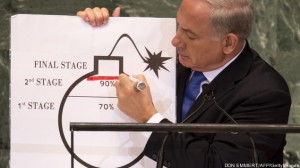 The prospect of an international rapprochement with Iran's President Hasan Rouhani has some Israeli officials missing his more blunt predecessor,�Mahmoud Ahmadinejad.
The prospect of an international rapprochement with Iran's President Hasan Rouhani has some Israeli officials missing his more blunt predecessor,�Mahmoud Ahmadinejad.Though Mr. Ahmadinejad made threats about the destruction of Israel and engaged in Holocaust denial, his remarks helped to stir sympathy for the Jewish state while isolating Iran.
Mr. Rouhani has steered clear of such remarks, embraced dialogue with the West, and even tweeted warm wishes for the Jewish new year. The friendly overtures have stirred concern in Israel that the new Iranian president will use the new reconciliatory tone to lull the international community into easing pressure on Iran over its nuclear program.
"We all had an easier time, ironically, with Ahmadinejad because he was so crude and so outspoken in such a base way that we could say that these guys are nut cases,'' a senior Israeli diplomatic official said.
"I doubt [Rouhani would] be as dumb enough to say the things that Ahmadinejad said," the official added. "He'll make music instead of noise.''
Israel's predicament in dealing with Mr. Rouhani's charm offensive was reflected in a political cartoon in Tuesday's Ha'aretz daily newspaper. The image depicts Israeli Prime Minister Benjamin Netanyahu arriving at the United Nations headquarters in New York holding the same nuclear bomb cartoon that he displayed during his U.N. speech last year, with Mr. Rouhani on his heels. It shows the perspiring Mr. Netanyahu thinking to himself: "Where is Mahmoud when you need him?"
In response, Israeli government officials have tried to cast Mr. Rouhani as being duplicitous about talks with the West. They cite a 2006 speech in which, as the country's lead nuclear negotiator, he argued that he was able to build up enrichment facilities despite international talks.
"For him, negotiations are an instrument for advancing the nuclear program further," said Dore Gold, a former Israeli ambassador to the U.N. who occasionally advises Mr. Netanyahu.
Mr. Ahmadinejad's refutation of the Holocaust helped Mr. Netanyahu liken the Iranian regime to that of the Nazis. Since Mr. Rouhani's election in June, the Israeli leader has drawn comparisons between Iran and North Korea, which managed to develop a nuclear program while it engaged the international community.
"Iran thinks that soothing words and token actions will enable it to continue on its path to the bomb," Mr. Netanyahu said Tuesday after instructing Israeli representatives at the U.N. not to attend Mr. Rouhani's address to the General Assembly.
"Like North Korea before it, Iran will try to remove sanctions by offering cosmetic concessions, while preserving its ability to rapidly build a nuclear weapon at a time of its choosing," he added.
Mr. Ahmadinejad's often-offensive remarks made him into a cultural figure whom Israelis could feel good about hating. He was lampooned in political satire shows and in television commercials, and he even inspired several spoof amateur videos.
Yaniv Cohen is an Iranian-Israeli amateur musician who wrote a sarcastic "love" song to Mr. Ahmadinejad that got extensive radio airplay and more than 100,000 hits on YouTube and was requested at numerous weddings.
But he said he won't be able to perform a similar song about Mr. Rouhani because even in Israel, "people want to give him a chance."
One Israeli communications expert who assists the country's government with media relations said Israel will have to shift from a diplomatic approach that focused on the character of Mr. Ahmadinejad. Instead, it will have to focus on reports by the U.N.'s International Atomic Energy Agency on Iran's nuclear program and the country's moves to allay concerns it is building a weapon.
"It was easier to put a devil's face on Ahmadinejad," he said. "We need to remember it's not a personal campaign. It's about the policy of Iran."
Alon Liel, a former Israeli foreign ministry director general, said he expects Mr. Netanyahu to portray Iran's regime as little changed and emphasize the similarities between the two Iranian presidents. Mr. Liel warned that would be a mistake and could open a rift with the international community.
He added that Israel needs a more nuanced response that welcomes Mr. Rouhani's tone while pressing hard for deeds to match.
"Israel got used to having a foolish enemy," he said. "When you say there is no change, meaning that all these smiles are not welcome, it will isolate Israel in the international community."
By The Wall Street Journal
The Iran Project is not responsible for the content of quoted articles.










